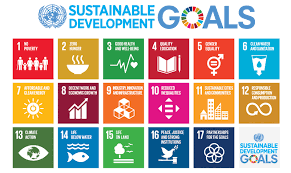The Sustainable Development Goals (SDGs), sometimes known as the Global Goals, are a set of 17 interrelated objectives agreed upon by all United Nations (UN) member states in 2015. These objectives are part of the 2030 Agenda for Sustainable Development, which provides a shared roadmap for peace and prosperity for people and the planet both now and in the future. Understanding the SDGs and their impact has never been more important, especially as the 2030 target date approaches.
Table of Contents
What Are the Sustainable Development Goals?
The Sustainable Development Goals seek to solve humanity’s most serious concerns, such as poverty, inequality, climate change, environmental degradation, peace, and justice. Here’s a quick summary of each goal:

- No Poverty: Put an end to poverty worldwide in all of its forms.
- Zero Hunger: Promote food security, nutrition, and sustainable agriculture.
- Good Health and Well-Being: Make sure everyone, regardless of age, leads a healthy life and fosters well-being.
- Quality Education: Ensure inclusive and equitable education and encourage lifetime learning opportunities.
- Gender Equality: Make all women and girls feel empowered by achieving gender equality.
- Clean Water and Sanitation: Ensure universal access and sustainable management of water and sanitation.
- Affordable and Clean Energy: Make sure that everyone has access to modern, affordable, dependable, and sustainable energy.
- Decent Work and Economic Growth: Encourage full and productive employment, decent work for all, and steady, inclusive, and sustainable economic growth.
- Sustainable Cities and Communities: Create inclusive, safe, resilient, and sustainable urban environments.
- Responsible Consumption and Production: Promote sustainable consumption and production practices.
- Climate Action: Act immediately to mitigate the effects of climate change.
- Life Below Water: Promote sustainable use of oceans, seas, and marine resources.
- Life on Land: Protect and restore terrestrial ecosystems, manage forests responsibly, combat desertification, and prevent biodiversity loss.
- Peace, Justice, and Strong Institutions: Fostering peaceful and inclusive societies, ensuring access to justice for everyone, and establishing accountable institutions.
- Partnerships for the Goals: Strengthen implementation strategies and revive global partnerships for sustainable development.
Why Are the Sustainable Development Goals Important?
The SDGs are a call to action to end poverty, protect the planet, and ensure that all people enjoy peace and prosperity. Here’s why they matter:
1. Universal Agenda: Unlike prior development programs, the SDGs apply to both developed and developing countries.
2. Interconnectedness: The goals acknowledge that development in one area often impacts progress in others. For example, achieving quality education (Goal 4) is critical to eliminating inequalities (Goal 10) and encouraging decent work (Goal 8).
3. Sustainability Focus: SDGs prioritize sustainable development to balance economic, social, and environmental factors.
4. Measurable Targets: Each goal includes explicit targets and indicators for evaluating progress and responsibility.
Progress and Challenges
Achievements
Since the adoption of the SDGs, there have been significant successes:
• Poverty Reduction: Global poverty rates have greatly decreased, but the COVID-19 pandemic has undone some of these advances.
• Access to Education: Many countries have seen unprecedented enrollment in primary school, indicating increased access to education.
• Renewable Energy: Rapid adoption of renewable energy sources helps meet Goal 7.
Challenges
Despite progress, several challenges remain:
• Economic Inequality: Income differences between and within countries are widening.
• Climate Change: Due to the impact of climate change, advancements in several fields are in danger of being reversed.
• Funding Gaps: Low-income nations generally lack the financial resources needed to achieve the SDGs.
• Global Crisis: Global crises, including the COVID-19 pandemic and geopolitical conflicts, have hindered progress and hampered cooperation.
How Can We Accelerate Progress?
Achieving the SDGs by 2030 requires collective action and innovative solutions. Here are some strategies:
1. Strengthening collaborations: The significance of international collaborations is emphasized in Goal 17. Governments, corporations, non-profits, and citizens must collaborate.
2. Leveraging Technology: Technology innovations, such as clean energy and digital education platforms, can promote sustainable development.
3. Policy Alignment: Governments should link their policies with the SDGs to ensure coordinated efforts.
4. Public knowledge: Raising knowledge of the SDGs may drive grassroots action and hold leaders accountable.
5. Private Sector Involvement: Businesses may support the SDGs by implementing sustainable practices and investing in relevant projects.
The Future of Sustainable Development Goals
As we approach 2030, the SDGs remain an important framework for addressing global concerns. However, reaching these ambitious targets would necessitate continued work, new solutions, and unflinching commitment from all parties. With joint action, we can achieve the vision of a sustainable and equitable world.
Conclusion
The Sustainable Development Goals are a comprehensive plan for creating a better future for everyone. By tackling the fundamental causes of global crises and supporting sustainable practices, the SDGs pave the way for a more equitable, successful, and resilient society. Whether as policymakers, businesses, or individuals, we all play a part in making this vision a reality. Let us work together to guarantee that the 2030 Agenda for Sustainable Development becomes a lived reality for future generations.
FAQs
When were Sustainable Development Goals introduced?
In 2015, the United Nations introduced a transformative global initiative called the Sustainable Development Goals (SDGs).
What are Sustainable Development Goals?
Sustainable Development Goals are a universal call to action to eradicate poverty, protect the planet, and ensure peace and prosperity for all.
Pingback: Climate Diplomacy: Meaning, Importance, India’s Role & Challenges [UPSC Notes] - internationalrelations101Climate Diplomacy: Meaning, Agreements, India's Role & Challenges [UPSC]
Good & Informative